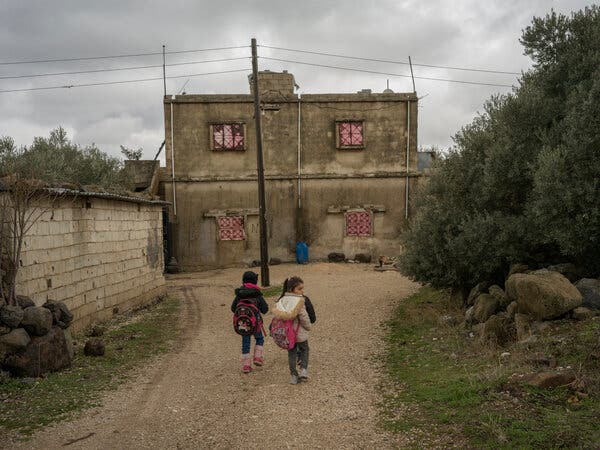The former president made inaccurate claims about his border wall, the Biden administration and a Russian pipeline, among other topics.

Former President Donald Trump spoke at the Conservative Political Action Conference in Orlando, Fla., on Saturday.
Former President Donald J. Trump repeated familiar boasts and grievances in a keynote speech at the Conservative Political Action Conference on Saturday.
Mr. Trump repeatedly invoked the lie that the 2020 election was “rigged” and mounted exaggerated attacks on President Biden. Even as he condemned Russia’s invasion of Ukraine as an “atrocity” and praised the country’s president, Volodymyr Zelensky, as a “brave man,” he repeated his misleading claim that the Obama administration had merely provided Ukraine with “blankets.”
Here’s a fact-check.
What Mr. Trump Said
“The wall will be quickly competed. We’ll build the wall and complete the wall in three weeks. It took two and half years on the wall, two and half years just to win all the litigation, over 11 lawsuits that they threw at us. And we have it just about finished, and I said they can’t be serious. They don’t want to close up the little loops.”
False. During his campaign in 2016, Mr. Trump promised to construct a 1,000-mile-long border wall that would be paid for by Mexico. By the time he left office, his administration had constructed 453 miles of border wall, most of which replaced or reinforced existing barriers. In places where no barriers previously existed, the administration built a total of 47 miles of new primary wall.
Mr. Trump’s vow that he would have been able to complete the wall within three weeks also does not track with the initial construction pace. Construction of replacement barriers in Calexico, Calif., began in February 2018, the first border wall project under Mr. Trump. Construction of the first new section of wall in the Rio Grande Valley began in November 2019. That amounts to 12.9 miles of replacement wall and 3.3 miles of new wall per month.
What Mr. Trump Said
“Just one year ago, we had the most secure border in U.S. history, record low gas prices.”
False. When Mr. Trump left office in January 2021, the national average price of a gallon of gasoline for that month was $2.42. That is not a record low. Gas prices fell to $2.21 in January 2015 under former President Barack Obama, $1.13 under former President George W. Bush and $0.96 under former President Bill Clinton.
What Mr. Trump Said
“I’m the one who ended his pipeline. He said you’re killing me with the pipeline. Nobody else ended his pipeline. Biden came in. He approved it.”
Live Updates: Russia-Ukraine War
Updated Feb. 27, 2022, 10:16 a.m. ET
- In Lviv, a resistance of baristas and janitors takes shape.
- At Russian Embassy in London, a police guard and a community rallying.
- Homes are destroyed as fighting rages on Ukraine’s northeastern front.
This is misleading. Mr. Trump was referring to the status of a natural gas pipeline between Russia and Germany under his administration and that of President Biden. In fact, American presidents — and most European countries other than Germany and France — have consistently opposed the project, but they have limited say in whether the pipeline is built.
Mr. Trump signed a law imposing sanctions on the Nord Stream 2 pipeline in December 2019, prompting a suspension in construction. But by then, most of the pipeline had already been built, with 2,100 kilometers laid and 300 kilometers remaining. Construction resumed a year later in 2020.
The current White House press secretary, Jen Psaki, described Nord Stream 2 as a “bad deal” that divides Europe and leaves Ukraine and Central Europe vulnerable to Russian manipulation. Secretary of State Antony Blinken said that the Biden administration’s opposition was “unwavering.”
Understand Russia’s Attack on Ukraine
Card 1 of 7
What is at the root of this invasion? Russia considers Ukraine within its natural sphere of influence, and it has grown unnerved at Ukraine’s closeness with the West and the prospect that the country might join NATO or the European Union. While Ukraine is part of neither, it receives financial and military aid from the United States and Europe.
Are these tensions just starting now? Antagonism between the two nations has been simmering since 2014, when the Russian military crossed into Ukrainian territory, after an uprising in Ukraine replaced their Russia-friendly president with a pro-Western government. Then, Russia annexed Crimea and inspired a separatist movement in the east. A cease-fire was negotiated in 2015, but fighting has continued.
How did this invasion unfold? After amassing a military presence near the Ukrainian border for months, on Feb. 21, President Vladimir V. Putin of Russia signed decrees recognizing two pro-Russian breakaway regions in eastern Ukraine. On Feb. 23, he declared the start of a “special military operation” in Ukraine. Several attacks on cities around the country have since unfolded.
What has Mr. Putin said about the attacks? Mr. Putin said he was acting after receiving a plea for assistance from the leaders of the Russian-backed separatist territories of Donetsk and Luhansk, citing the false accusation that Ukrainian forces had been carrying out ethnic cleansing there and arguing that the very idea of Ukrainian statehood was a fiction.
How has Ukraine responded? On Feb. 23, Ukraine declared a 30-day state of emergency as cyberattacks knocked out government institutions. Following the beginning of the attacks, Volodymyr Zelensky, Ukraine’s president, declared martial law. The foreign minister called the attacks “a full-scale invasion” and called on the world to “stop Putin.”
How has the rest of the world reacted? The United States, the European Union and others have condemned Russia’s aggression and begun issuing economic sanctions against Russia. Germany announced on Feb. 23 that it would halt certification of a gas pipeline linking it with Russia. China refused to call the attack an “invasion,” but did call for dialogue.
How could this affect the economy? Russia controls vast global resources — natural gas, oil, wheat, palladium and nickel in particular — so the conflict could have far-reaching consequences, prompting spikes in energy and food prices and spooking investors. Global banks are also bracing for the effects of sanctions.
But the State Department nonetheless lifted sanctions on the company building the pipeline in May 2021. According to the nonpartisan Congressional Research Service, this might be because “the administration’s ability to prevent the pipeline from becoming operational is limited” while sanctions “could jeopardize U.S.-German and U.S.-European cooperation in other areas, including countering Russian aggression.”
Mr. Biden issued new sanctions on the pipeline this week after Germany announced that it would suspend the certification of the pipeline in response to Russia’s invasion of Ukraine.
What Mr. Trump Said
“The reason we’ve got soaring gas prices is because Biden has shut down American energy, canceled our oil and gas leases just two days ago. Two days ago, they canceled many oil and gas leases because of the environment.”
This is misleading. The Biden administration indefinitely halted new federal oil and gas leases and permits in response to a court ruling. It did not revoke existing leases. A federal judge had blocked the way the administration was calculating the cost of climate change, leading the administration to pause regulatory decisions that relied on the metric.
Source: nytimes.com



